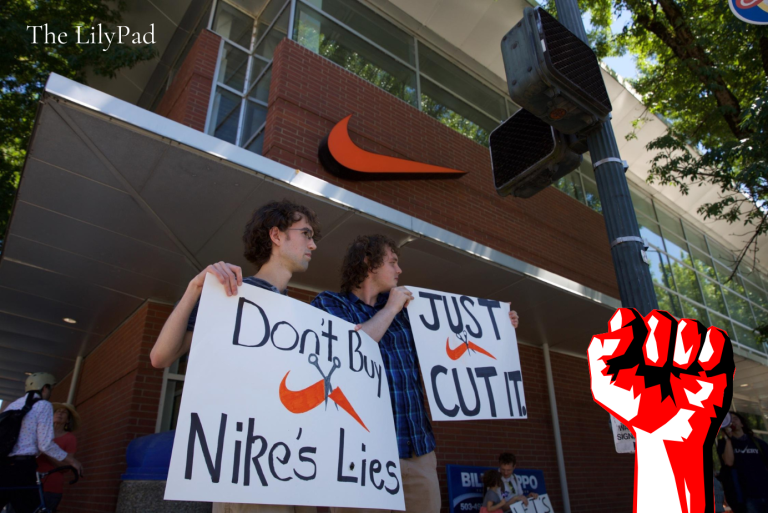Boycotting corporations whose products are the default mental image of the commodities they offer isn’t as hard as some people make it out to be. It’s no surprise that many are quick to assume “boycotts don’t work” when contemporary society tends to either use them as a suggestion or call for boycotts of virtually everything.
The birth of the boycott comes from history’s strongest protestors: the Irish. In 1880, Irish Nationalist Charles Parnell suggested the ostracization of a British estate manager named Charles Boycott, who was known for overcharging and evicting Irish residents. His resulting change in policy helped coin the term boycott and popularized the tactic, especially among labor organizations and unions.
More than a century later, the tik-tok-ification of information consumption has led to a snowball effect that can hinder the public perception of boycotting as a political tool: as easy as it is to spread information through platforms like TikTok and Instagram, calls for boycotts against hundreds of brands for a multitude of reasons concerning people from all walks of life can be easily popularized. Seeing the growing number of brands mentioned in tandem with the term ‘boycott’ can cause people to feel helpless as a single consumer, as it may be unrealistic for them to be able to avoid all of the brands being discussed, which often leads to them ignoring the idea altogether.
The point of a consumer boycott is to put economic pressure on a company until they change their practices–and it works. But this model is obviously hindered when people are not willing to participate and continue to financially support a certain brand regardless. Social media’s growth into an omnipresent behemoth might have put a roadblock in our ability to organize effective boycotts through worship of consumerism and the curse of going viral.
Before 60% of the world had access to social media as they do today, boycotting had the potential for significant change, even among the world’s biggest corporations. In the 1990s, a global boycott of sportswear giant Nike was launched after it was reported that the company was utilizing child labor, ignoring minimum wage and overtime laws in places such as Pakistan, Indonesia and Cambodia. Eventually the boycott efforts led to Nike’s overall revenues falling by 16% and its share price to drop by 57% before they were forced to address customer concerns, and increase transparency over tenfold in their production process in 2000.
In the post-Instagram era, the growth of social media coverage of the attacks on Gaza in the past years, have led many to become aware of the Boycott, Divestment, Sanctions (BDS) movement targeted towards “companies that play a clear and direct role in Israel’s crimes”. The BDS targets “carefully selected companies and products for maximum impact”. But the efforts of the BDS were hindered in the past years by social media users attempting to popularize a boycott against nearly every company listed by the BDS movement as having ever had financial relations with Israel, rather than the companies listed as their primary consumer boycott targets.
There are, of course, examples of social media aiding boycott purposes, particularly to achieve less political goals. In 2021, after member Chuu was removed from Korean girlband LOONA for demanding to be paid for her five years of work at entertainment company BlockBerry Creative, fans decided they could no longer in good conscience financially support the record company representing the band. As a result, their fans and others both within Korea and internationally upset by the treatment she had received as an artist organized almost militarily, putting pressure on eachother and outsiders to refrain from streaming the band’s music on any monetized platform or purchasing anything related to the record label. The publication of the boycott aided in the Korean judicial system’s decision to allow the rest of the band to terminate their contracts with the label.
Critics of boycotts generally have the mindset that lack of their individual monetary support would not be influential enough on corporations to impact them. This is exactly why it is increasingly harder with time to find examples of successful boycotts–corporations are not somehow becoming immune to losing money. Rather, it seems we are losing the ability to organize to make this happen.
This is not a complete attack on the human will–it is by design that modern capitalism can make it close to impossible to successfully boycott a brand when it acts as a conglomerate owner over 90% of the products looking at you when you walk into a supermarket. Even more difficult is the task of filtering out misinformation and clickbait from everything you hear on social media.
Truthfully, if a boycott were launched against every corporation engaging in morally ambiguous human rights practices or with contradicting political views to large portions of the population, there could be an easy argument to boycott every company on Earth. Turning to the boycott as the default protest method has seemed to water down the term, letting people forget how powerful one can be when it is specific and targeted. Boycotts work, just not when we ask for them so often that it turns into white noise to the general public.

